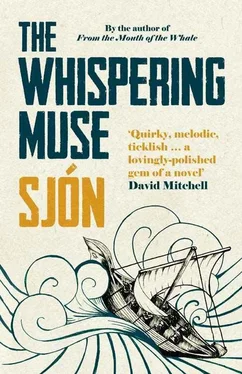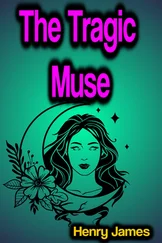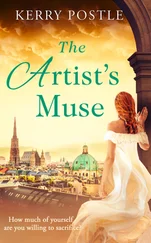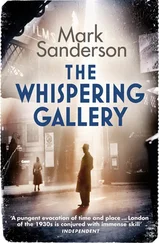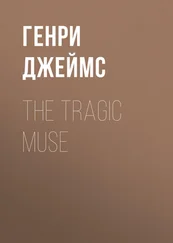‘It’s where he gets the story from…’
At these words the second mate put down the piece of driftwood. And began his tale:
‘Many things can befall a sailor in his life; the perils await him not only at sea but also in far-off ports. I wish to tell you about a train of events that led me into a piece of foolishness, which resulted in such misfortune that I came within an inch of losing my life.
‘I was a deckhand on a ship called the ‘Argo’. We were crossing the Aegean, having set sail from the city of Iolcus in Magnesia with a long voyage ahead. The ship was newly built and fitted out with the finest rigging, but contrary winds and an unusually heavy swell had caused us to drift somewhat off our course at the very outset of our adventure. When we made land-fall on the island of Lemnos it was with the intention of taking on water and provisions — there was certainly no other plan — and it should by rights have detained us no more than a couple of days. But in the event we were to spend nearly ten months on the island.
‘Admittedly we thought it strange that there were no ships lying in the harbour and that we hadn’t encountered any craft in the approaches to the port, but as we were eager to reach land it was not enough to rouse our suspicions and make us cautious. Nor were we troubled by the fact that the docks were empty of people. The men exchanged glances and said that the citizens must be in the city celebrating some festival — and wasn’t it a happy coincidence that we should turn up at such a time? We put out a boat and two of the crew piloted the ship to the harbour side. There we reefed the mainsail, moored the ship and stepped ashore.
‘The first reaction of a man who has come ashore from the sea is to wonder that the earth should be so firm beneath his feet. This lasts for an instant before being succeeded by another sensation that feels as if it will never end: thirst. In an instant all the salt that one has inhaled from the sea air is released from one’s lungs to crystallise on the tongue, coating it like a glittering iron glove. And only one thing can quench that fire: wine.
‘We looked as one man at the captain, who was standing by the gangway with the helmsman, and our eyes flashed with the eagerness of athletes at the starting line. A whole lifetime passed in this way, ending when the captain folded his arms across his chest and slowly shook his head. We emitted a pained sigh, the happy hopefulness fell from our faces, our shoulders drooped. The helmsman looked from this wretched rabble to his captain, who gave a sly smile. The helmsman laughed aloud. And the captain shouted at us, his white teeth flashing in the burning midday sun:
‘“By holy Dionysus, men, go forth and be merry!”
‘And we answered in chorus:
‘“Long live the son of Aeson, long live Captain Jason!”
‘It should be mentioned here that this crew consisted of no weaklings, but of the greatest heroes known to man. Each and every one of us could have steered an entire fleet to victory, each and every one of us had the courage to meet whatever foes may be, whether of human or monstrous kind, but before thirst, even the greatest champions must concede defeat. We raced off up the wharf, for all the world like a swarm that has found the rotting carcass of an ass in a cabbage bed, making a beeline for the first tavern that met our eyes, and charged over the threshold with a great yell of jubilation. But our joy was short-lived, the yell died on our lips: it was a ghost town, there was nothing here but a layer of dust covering the benches and tables. We broke into the next tavern, and the next and the next; everywhere the same sight met our eyes.
‘The wine barrels had burst and the long-desired drink mouldered black as blood among the broken staves.
‘Oh, the disappointment!
‘We turned on our heel and trudged back to the ship with aggrieved complaint. When Jason son of Aeson saw his sailors returning to the quay so woebegone he grew thoughtful. And on hearing that the dock area had succumbed to moths and rust, he ordered us to prepare without delay for battle with the monster that had evidently destroyed all human life on the island. He sent Phalerus, skilled in feats of arms, into the city to spy it out and with him the huntress Atalanta, the only woman among our number. They were well armed, as always, when there was the prospect of a hunt.
‘These two had not gone far before they returned to the ship leading between them a golden-haired maid child that a group of terrified women had sent out to meet them. In her lily-white hand the girl held a papyrus scroll. The troop of armour-clad heroes stood aside, opening a path for the small maiden to the gangway where Jason greeted her. She handed him the scroll that the son of Aeson unrolled and read with interest.
‘The rest of us waited; soon we would know whether plague or a monster was responsible for the sinister state of the land. Meanwhile the stout midshipman Heracles set the child on his knee and performed tricks for her amusement.’

I couldn’t sleep that night. I had nodded during the second mate’s story and finally fallen asleep and in my dozing state the tale seemed to become ever more far-fetched. When the steward nudged me awake I was sitting alone at the captain’s table in the saloon. All signs of the excellent repast had vanished.
I entered my cabin to find it baking hot. The first engineer’s so-called repairs had involved no more than running scalding water into the radiators, then tightening the taps. To make matters worse the wind picked up from the northwest, accompanied by rough seas, so the ship, which was empty, began to roll and pitch. Chairs and other loose fittings took to the air, the drawers shot out of the chest, cupboard doors banged ceaselessly and I was frantically engaged in trying to keep them under control until the early hours. When I finally managed to lie down, pouring with sweat under the empty quilt cover like an inhabitant of the tropics, a bustle began in the saloon: the whistling steward was preparing breakfast. I didn’t have the strength to get up and give him a piece of my mind.
So, clattering crockery and clinking cutlery formed my lullaby on my first ‘night’ as a guest on board the flagship of my benefactor, Mr Magnus Jung-Olsen.
THAT MORNING the MS Elizabet Jung-Olsen had cruised into Fedafjord, one of those endless Norwegian fjords, and now lay moored in a small bay at the foot of a lofty mountain. The settlement was a disgrace; shabby workers’ huts had been thrown up higgledy-piggledy on the rock, with the sawmill and a large warehouse below. The only building worthy of the name of human habitation in this godforsaken hole was a yellow two-storey house that stood at the end of the jetty. Meanwhile the gold — colossal tree trunks in their hundreds — floated in the bay.
After lunch I took a turn about the deck. I had a headache from the vicissitudes of the night before and was feeling lethargic following a midday meal of horse sausage with mashed potatoes and white sauce, but I found relief in watching the production of the paper pulp that was to be our cargo on this trip. Two steel cables ran from the mill and warehouse up to the summit of the mountain that towered a thousand feet above the seedy little settlement. I was informed that from there the cables ran overhead straight to the doors of a timber-working factory located ten miles away up the long tapering valley. I watched the workmen dragging the tree trunks up the beach, loading them on sleds and sliding them into the mill. There the monster logs were chopped into chips and the chips were put into wagons, which then rolled along the cable that carried them up the valley to the factory. After the wood chips had been shredded, pulped, blended with this and that chemical and pressed into sheets, they returned as iron-bound blocks of raw paper, running back down the cable that ended up in the warehouse by the wharf. There the raw paper was stacked and finally loaded on board the ships that came from every direction to transport it around the globe.
Читать дальше
